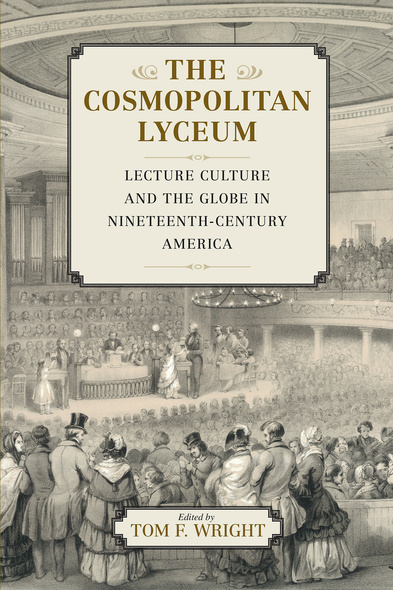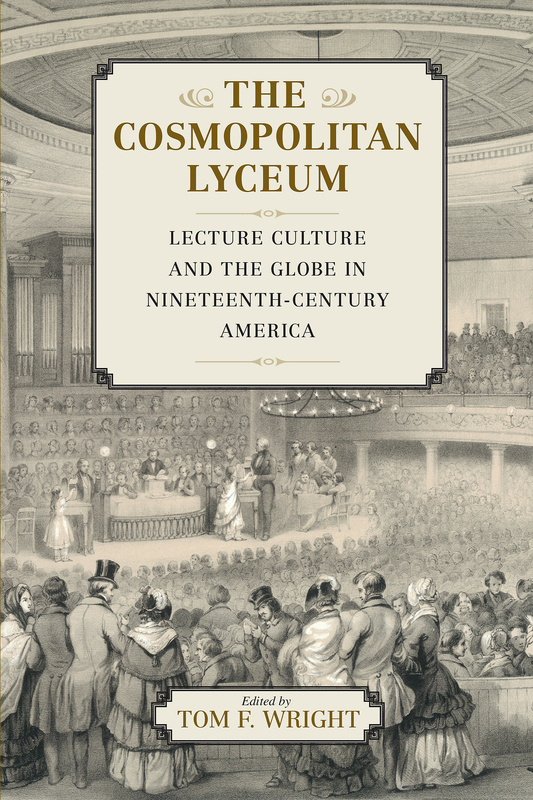The Cosmopolitan Lyceum
Lecture Culture and the Globe in Nineteenth-Century America
Edited by Tom F. Wright and Tom Wright
University of Massachusetts Press
From the 1830s to the 1900s, a circuit of lecture halls known as the "lyceum movement" flourished across the United States. At its peak, up to a million people a week regularly attended talks in local venues, captivated by the words of visiting orators who spoke on an extensive range of topics. The movement was a major intellectual and cultural force of this nation-building period, forming the creative environment of writers and public figures such as Frederic Douglass, Ralph Waldo Emerson, Anna Dickinson, and Mark Twain.
The phenomenon of the lyceum has commonly been characterized as inward looking and nationalistic. Yet as this collection of essays reveals, nineteenth-century audiences were fascinated by information from around the globe, and lecturers frequently spoke to their fellow Americans of their connection to the world beyond the nation and helped them understand "exotic" ways of life. Never simple in its engagement with cosmopolitan ideas, the lyceum provided a powerful public encounter with international currents and crosscurrents, foreshadowing the problems and paradoxes that continue to resonate in our globalized world.
This book offers a major reassessment of this important cultural phenomenon, bringing together diverse scholars from history, rhetoric, and literary studies. The twelve essays use a range of approaches, cover a wide chronological timespan, and discuss a variety of performers both famous and obscure. In addition to the volume editor, contributors include Robert Arbour, Thomas Augst, Susan Branson, Virginia Garnett, Peter Gibian, Sara Lampert, Angela Ray, Evan Roberts, Paul Stob, Mary Zboray, and Ronald Zboray.
The phenomenon of the lyceum has commonly been characterized as inward looking and nationalistic. Yet as this collection of essays reveals, nineteenth-century audiences were fascinated by information from around the globe, and lecturers frequently spoke to their fellow Americans of their connection to the world beyond the nation and helped them understand "exotic" ways of life. Never simple in its engagement with cosmopolitan ideas, the lyceum provided a powerful public encounter with international currents and crosscurrents, foreshadowing the problems and paradoxes that continue to resonate in our globalized world.
This book offers a major reassessment of this important cultural phenomenon, bringing together diverse scholars from history, rhetoric, and literary studies. The twelve essays use a range of approaches, cover a wide chronological timespan, and discuss a variety of performers both famous and obscure. In addition to the volume editor, contributors include Robert Arbour, Thomas Augst, Susan Branson, Virginia Garnett, Peter Gibian, Sara Lampert, Angela Ray, Evan Roberts, Paul Stob, Mary Zboray, and Ronald Zboray.
An excellent book. Perhaps its greatest strength is that it participates in several current scholarly conversations: not only discussions of the nature of cosmopolitanism and its relationship to nationalism but also exchanges about oratory, audiences, travel writing, transatlantic and trans-pacific intellectual life, and the relationship between oral and print cultures.'—Joan Shelley Rubin, author of Cultural Considerations: Essays on Readers, Writers, and Musicians in Postwar America
'Tom F. Wright's ambition in editing The Cosmopolitan Lyceum is twofold. First, he seeks to advance and bring into dialogue two big interdisciplinary trends: the burgeoning scholarship on cosmopolitanism and the lyceum as an institution, and on the nineteenth-century public lecture as a cultural practice. In this goal Wright and his eleven authors succeed brilliantly. The book is full of new insight into old topics.'—Journal of American History
Tom F. Wright is lecturer in nineteenth-century literature at the University of Sussex.





